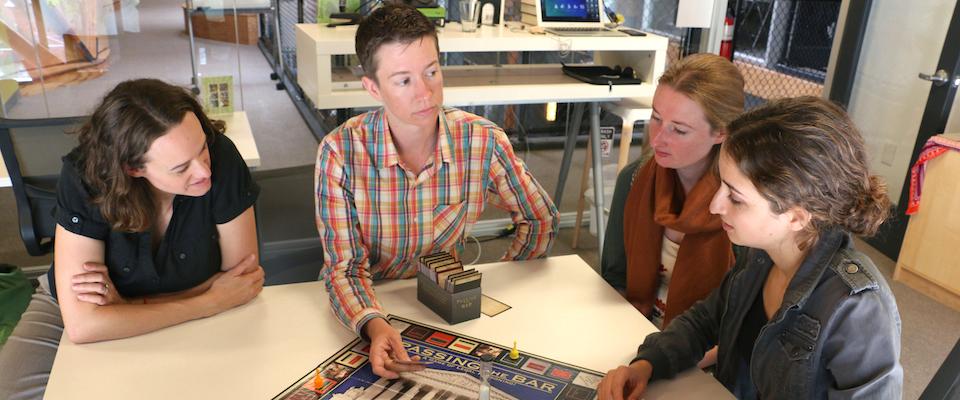When Kai Haswell graduated from UC Berkeley in May, he found himself in a predicament shared by many new lawyers. After three years of backbreaking studying and tens of thousands of dollars spent on tuition fees, he couldn’t find a job.
Haswell knew what he was passionate about—employment discrimination—but the Bay Area is saturated with legal professionals who specialize in it. Job opportunities were scarce at smaller firms, and he wasn’t thrilled at the idea of working in a corporate office. There was another option, but Haswell wasn’t seriously considering it: setting up a solo practice.
“It just seemed too big,” Haswell says. “I’m not independently wealthy, so the idea of trying to make enough money to survive the first few months while I get my practice together—when I don’t even really know a lot about the law—that was really intimidating.”
Setting up a solo practice isn’t impossible. In fact, about 60 percent of practicing California lawyers run their own business. But for new law school graduates—especially those interested in the un-lucrative field of public interest law—the prospect of building their own practice is daunting.
For enterprising attorneys, help is arriving: creation of a new incubator that will train recent law school graduates on how to set up their own practices dedicated to serving clients of modest means.
In January, the Alameda County Bar Association and the Volunteer Legal Services Corporation received a $45,000 grant from the state bar’s California Commission on Access to Justice to create the Bay Area Regional Incubator Project. At the moment, law graduates from Berkeley Law at UC Berkeley, UC Hastings, University of San Francisco, Santa Clara University and Golden State University are able to apply for a position in the incubator. The first cohort, which starts in 2016, will be composed of 15 students—three from each school—and another cohort of 15 will start in 2017.
Here’s how the incubator works: Over the course of two years, participants in the incubator learn how to practice law in the real world. This may seem like something that would (and should) be covered in law school, but according to Tiela Chalmers, CEO of the county bar association, that’s usually not the case.
“We learn a lot of excellent things in law school, but not as much practical advice about how to actually handle a case, and how to open up your own practice and run a business,” says Chalmers, a UC Berkeley graduate. “People learn them in the schools of hard knocks, but that’s a rough place to do it, especially with the risk of malpractice hanging over your head.”
The incubator will pair participants with seasoned attorneys who can give them practical training on running their own firm. This ranges from advice on building a case or running a trial to figuring out how to manage the daily operations of a law firm.
But learning how to set up a solo practice is only half the work. Participants will also be matched with legal service agencies and firms, where for six months they must spend 20 hours a week doing pro bono work for low-income clients. After they leave the incubator, they are expected to devote at least 50 percent of their caseload to modest-means clients. According to Melanie Rowen, associate director for public interest at Berkeley Law, this is part of the incubator’s greater effort to close society’s “justice gap.”
“There are thousands and thousands of clients who really need legal representation, but because they’re in that low- to moderate-income band, they can’t afford anyone,” Rowen says. Conversely, “we have people graduating from law school who would love to serve those clients, but don’t have the structure to plug into to create a practice.”
Critics fault law schools for failing to provide adequate opportunities for aspiring lawyers interested in social justice causes.
“Are we going to law school to learn theoretical concepts from 200 years ago? Or are we going to law school to train lawyers how to be engaged in their community and make a difference?”
Katherine Katcher, who graduated from Berkeley Law in 2013, laments that as a student she didn’t encounter a program like the Bay Area Regional Incubator project. She says that many law schools seem to funnel students into only a handful of career paths.
“If you’re brilliant, you’re supposed to go do a clerkship, and [then] you’re sent to work at a firm, and you work at a firm for 15 years, and then you’re allowed to think more creatively about the world,” Katcher says. “They’re losing a lot of potential and brilliance by not actively engaging students with social entrepreneurship.”
So why are law schools only now partnering with legal incubators? Some people think it has to do with the Great Recession, which laid waste to the legal field. Thousands of recent law school graduates were looking for work, and a massive number of low- to moderate-income clients were looking for representation. According to Rowen, a New York attorney named Fred Rooney was the first to recognize how to solve both problems at once. After the development of a legal incubator at the City University of New York in 2007, incubators began popping up across the country. At a recent conference in San Diego, Rowen found herself mingling with representatives from 100 different legal incubator programs.
But a crisis might not have been the sole motivation. Rowen speculates that incubators may be an inevitable step as law schools evolve toward more practice-oriented, clinical education.
As legal education changes, so will the priorities of educators and young lawyers. Incubators have the potential to create a sea change in the legal community, Katcher contends, by getting law schools to reconsider the purpose of a legal education.
“Are we going to law school to learn theoretical concepts from 200 years ago?” Katcher asks. “Or are we going to law school to train lawyers how to be engaged in their community and make a difference?”




















